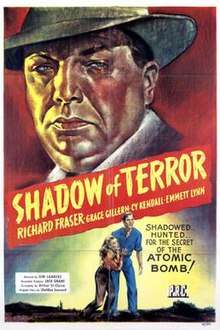Shadow of Terror
Shadow of Terror is a 1945 American thriller film directed by Lew Landers and written by Arthur St. Claire. The film stars Richard Fraser, Grace Albertson, Cy Kendall, Emmett Lynn, Kenneth MacDonald and Eddie Acuff. The film was released on October 5, 1945, by Producers Releasing Corporation.[1][2][3]
| Shadow of Terror | |
|---|---|
 Theatrical release poster | |
| Directed by | Lew Landers |
| Produced by | Jack Grant |
| Screenplay by | Arthur St. Claire |
| Story by | Sheldon Leonard |
| Starring | Richard Fraser Grace Albertson Cy Kendall Emmett Lynn Kenneth MacDonald Eddie Acuff |
| Music by | Karl Hajos |
| Cinematography | Jack Greenhalgh |
| Edited by | Roy Livingston |
Production company | |
| Distributed by | Producers Releasing Corporation |
Release date |
|
Running time | 60 minutes |
| Country | United States |
| Language | English |
Plot
Cast
- Richard Fraser as Jim aka Howard Norton
- Grace Albertson as Joan Rutledge
- Cy Kendall as Victor Maxwell
- Emmett Lynn as Elmer
- Kenneth MacDonald as McKenzie
- Eddie Acuff as Joe Walters
- Sam Flint as Sheriff Dixon
gollark: LONG QUIZ TIME!
gollark: Triangles? Excellent.
gollark: Heavserver's Wordoidal Olfactory Epithelium %wheel #43584572 Group (upper management) is *somehow* now in negotiations with (indirectly?) The Eye regarding a bot we're *apparently* not meant to have.
gollark: What *is* the "right" login? Can any login ever truly be "right"?
gollark: Better fix this then compile to brpy.
References
- "Shadow of Terror (1945) - Overview". TCM.com. Retrieved 2018-12-28.
- Sandra Brennan. "Shadow of Terror (1945) - Lew Landers". AllMovie. Retrieved 2018-12-28.
- "Shadow of Terror". Catalog.afi.com. Retrieved 2018-12-28.
External links
This article is issued from Wikipedia. The text is licensed under Creative Commons - Attribution - Sharealike. Additional terms may apply for the media files.